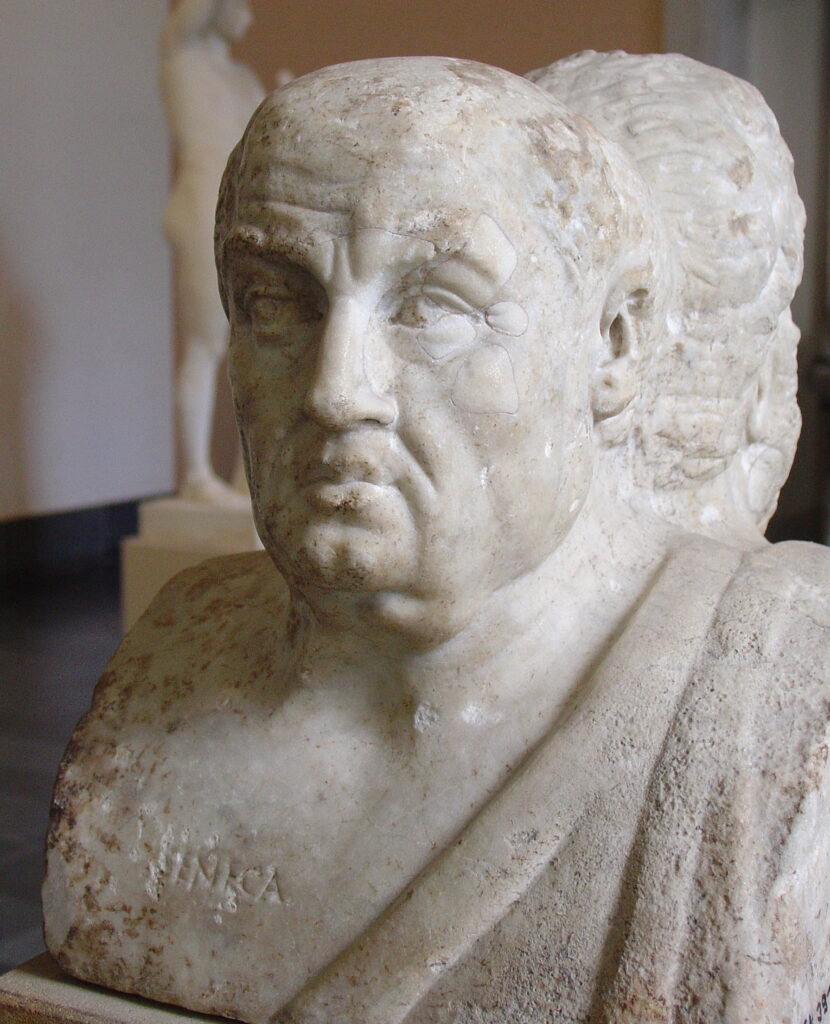Seneca’s Philosophy of Giving

Credit: Calidius
Licence: GNU Free Documentation License, Version 1.2, CC-BY-SA-3.0-migrated
21 May 2004
| Giver: | Individual |
|---|---|
| Receiver: | - |
| Gift: | - |
| Approach: | Philanthropy |
| Issues: | 10. Reduced Inequalities |
| Included in: | Philanthropy in Early Civilizations |
Seneca (4 BCE-65 CE) was a Stoic philosopher, politician and dramatist. His monumental treatise De Beneficiis (c. 63 CE), or “On Benefits,” provides an exhaustive analysis of the practice of giving in ancient Rome and remains one of the few works on the subject of generosity to survive from antiquity. For Seneca, the virtues that form the bedrock of a healthy society – among them trust, reciprocity, civility and kindness – largely stem from the giving and receiving of gifts. Generous acts promote general happiness and instill a sense of mutual obligation between individuals, ultimately strengthening the social fabric.
Seneca’s notion of generosity is rooted in the Latin humanitas (“humanity” or “humaneness”), a concept derived from the Greek philanthrôpia, or “love of humankind.” In Seneca’s worldview, qualities of beneficence and gratitude are central to humanitas. Performed with magnanimity and compassion, an act of giving ennobles the benefactor, who reaps the satisfaction of having helped a fellow citizen while contributing to the betterment of society as a whole.
Seneca also places a high value on the attitude of the beneficiary. Gratitude represents one of the highest moral virtues in Seneca’s philosophy, both as an appropriate response to a benefit received, and as an expression of fellowship with the giver. By accepting a gift with graciousness and respect, a recipient acknowledges their responsibility to the giver, while strengthening the bond between them. By establishing solidarity and trust between members of a society, gratitude promotes a feeling of joy.
Conversely, Seneca views ingratitude as destructive and undermining. Feelings of ingratitude erode social cohesion, posing a threat to overall harmony and stability. Ingratitude also harms the psychology of the beneficiary. Whereas gratitude fills the recipient of a gift with a sense of well-being, ingratitude results in feelings of self-loathing and shame. The refusal to show appreciation for an act of generosity also represents a personal betrayal, one that alienates ungrateful individuals from others.
For Seneca, only generosity itself can disarm the insidious power of ingratitude. A benefactor should persist with their generous actions, in the hope that they might guide the ungrateful beneficiary toward a proper understanding of what they have received. In following this precept, the benefactor emulates the gods, who continually bestow blessings onto humanity despite their moral failings.
Seneca viewed ingratitude as pervasive in the Roman world and believed that it posed a significant danger to the future of civilization. Yet despite his pessimism, he also believed in the innate ability of principled individuals to reshape society for the better. This unwavering faith in the restorative power of generosity offers a powerful message of resilience and hope for the modern age.
Contributors: Maha Tazi, Stephen Meyer
| Source type | Full citation | Link (DOI or URL) |
|---|---|---|
| Publication |
Bond, Sarah. “Philanthropy in ancient times: some early examples from the Mediterranean”. Free Science Encyclopedia, 2011. |
https://sofii.org/article/philanthropy-in-ancient-times-some-early-examples-from-the-mediterranean |
| Book |
Fitch, John. Seneca. Oxford University Press, 2008. |
- |
| Book |
Gori, M; Carlà, F. (ed.) “Limiting Generosity: Conditions and Restrictions on Roman Donations” in Gift-Giving and the Embedded Economy in Ancient Greece and Rome, 241-268. Universitätsverlag Winter, Heidelberg, 2014. |
- |
| Book |
Griffin, Miriam T. Seneca: A Philosopher in Politics. Oxford University Press, 34, 1976. |
- |
| Book |
Harpham, E. “Gratitude in the History of Ideas”, in M. A. Emmons and M. E. McCulloch, editors, The Psychology of Gratitude, 19–37. Oxford University Press, 2004. |
- |
| Book |
Harrison, George W.M. (ed.), Seneca in performance. Duckworth, 2000. |
- |
| Book |
Haskell, Henry Joseph. This was Cicero. Fawcett Publications Incorporated, 300–301, 1994. |
- |
| Book |
Merriam-Webster, Inc. “Ciceronian period”. Merriam-Webster’s Encyclopedia of Literature. Merriam-Webster, 244, 1995 |
- |
| Publication |
Motto, Lydia Anna. “Seneca on Trial: The Case of the Opulent Stoic”. The Classic Journal, 61, No. 6 (1966): 254–58 |
- |
| Book |
Sluiter, Ineke; Rosen, Ralph M. Aesthetic Value in Classical Antiquity. Brill, 399, 2012 |
- |
| Book |
Wood, Neal. “Cicero’s Social and Political Thought”. University of California Press, 1991. |
- |